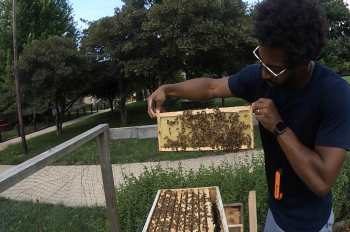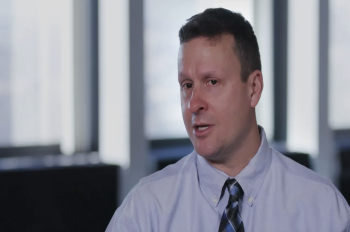Unlocking AI’s Power in the Workplace

Since Layla Shalabi (AI, M.A.S. ’24) began her studies in artificial intelligence, the technology has made leaps and bounds in its application, so much so that she is taking her AI skills to the world of accounting and financial consulting.
“When I started at Illinois Tech, the technology was a black box—something farfetched—to the general population,” she says. “But now it’s ingrained in everything that we do.”
Shalabi will begin her career as a cloud and digital engineering consultant with PwC, where she will utilize AI technologies to improve the performance and productivity of clients and internal personnel.
She became acquainted with PwC after taking part in a summer internship with the company. She had no exposure to the consulting industry, but quickly learned that her expertise was valuable beyond the traditional settings of technological applications.
“In my field, we’re seeing a great demand in all industries for AI experts to bridge the gap between the technology and the common user,” she says. “With my knowledge and experience, I can design purpose specific, AI powered tools for clients to automate a lot of foundational processes that would otherwise require a team of people to manage. All the while, maintaining a people-focused methodology during design, development, and user integration.”
As an intern, Shalabi says she realized how people like her are important to PwC’s success.
To do great things, she says, you need a good supportive team. She learned of the true impact of a culture centered around growth from colleagues with diverse backgrounds in consulting. She attests to her own personal and professional growth during the internship which allowed her to respond by developing the tools they needed to satisfy their requirements.
“The best way to use AI is as a helpful guide, not as our only source of information,” Shalabi says. “We’ve seen certain AI models be ‘convinced’ of incorrect information. I prefer to use it for low-stakes, menial tasks, to increase my time efficiency without risking plagiarism or compromising my data.”
Not only will she be developing tools that will help clients and consultants be more productive, but she also will be training them in the best ways to use these tools.
She believes that roles similar to hers will be incorporated into workplaces by more and more companies in the future.
“People who I know currently in the industry have seen reorganizations in companies with AI in mind,” she says. “The tech industry is known for demanding up-to-date knowledge and understanding of the latest innovations, and the transition with AI is no different. People who have the knowledge to use the AI tools are more secure versus those who don’t.”
Shalabi’s performance as an intern at PwC helped her land the full-time job there. She says the coursework at Illinois Tech helped her prepare for success as an intern.
“The application projects that we worked on were extremely relevant and provided a wonderful foundation for the internships that I have done,” she says. “I took a course on AI language understanding, and the following summer, during my internship, I was developing an AI chatbot.”
She says that direct translation allowed her to keep pace with the professionals that she worked shoulder to shoulder with that summer.
“For me, what sets Illinois Tech apart from other universities is the professors here,” she continued. “I’ve had a couple of professors who handed me applications for an internship and encouraged me to apply. They knew they were reputable companies with professionals who would be great guides. You definitely don’t find that kind of investment in students at every university.”
As a CAMRAS scholar, Shalabi says she learned professional skills that complement her AI knowledge.
“They provide seminars on things like how to set up a LinkedIn profile and tips to use it,” she says. “Also, professional seminars, career panels, or fireside chats with experts currently working in the industry gave us the opportunity to talk to them about what to do to better prepare. They were super helpful and made me more comfortable entering the field.”
As a result, Shalabi says she is excited about the benefits that AI can bring to society, and she looks forward to entering a career as an AI leader and innovator.
“The limitless aspect of the technology is exciting,” she says. “There is so much room to explore and expand. With AI as the medium with which I am interacting with all these disciplines, I know there will never be a dull moment in my career.”




